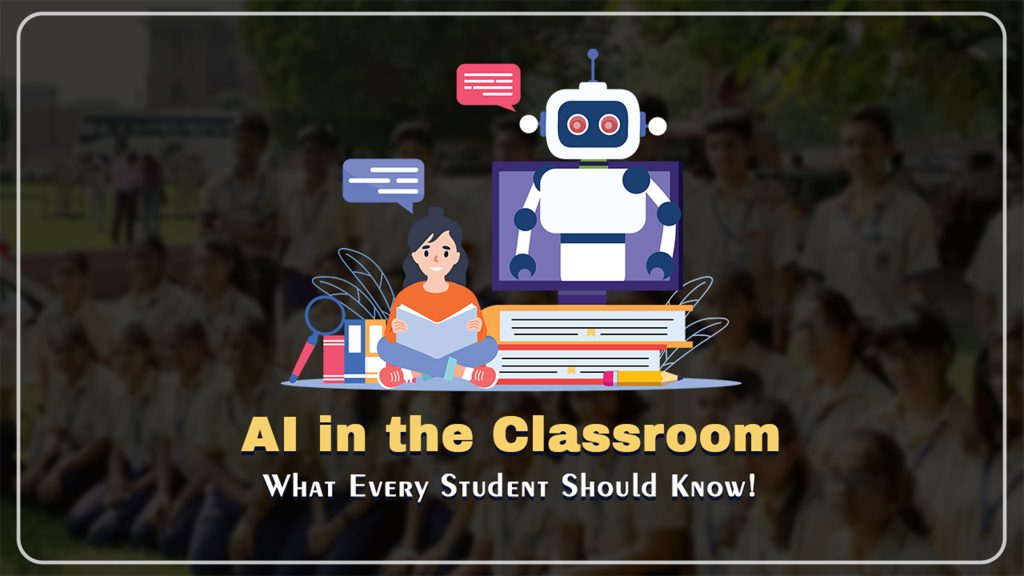
Hey there, future innovators! 👋 Ever wondered how your smartphone seems to know what you’re thinking? Or how do your favourite apps always recommend just what you need? Dive into the world of Artificial Intelligence (AI) and see how it’s transforming education! The application of AI in education is revolutionising how we learn, making it essential to understand both its potential and its limits.
AI 101: The Basics
AI, or Artificial Intelligence, refers to smart machines capable of tasks usually requiring humans. Unlike traditional computers, AI uses machine learning to improve over time. This ability, combined with Big Data, drives a digital transformation in education. Think of AI as a study buddy that adapts to your strengths and weaknesses. The importance of AI in education lies in enhancing and personalising learning experiences without replacing your efforts.
Your Personal Academic Sidekick
One of the best uses of AI in education is personalised learning. AI adjusts lessons to match your pace and preferences. For example, if you’re strong in math but need help with literature, AI can challenge you with more challenging math problems while offering extra help in literature. Adaptive learning platforms create a tailored experience for each student.
But remember, AI is just a tool. It can’t replace hard work, creativity, or the human connection you get from teachers and classmates. These AI-driven educational tools are designed to support, not substitute, traditional learning methods.
AI Ethics: Using It the Right Way
With great power comes great responsibility. AI in the education sector offers many opportunities, but it also raises important ethical questions. Ethics in AI education is a crucial topic that every student should be aware of:
- Bias: AI learns from data, and if that data is biased, the AI might make unfair decisions.
- Dependence: If we rely too much on AI, what happens to critical thinking and creativity?
- Privacy: AI tools collect data to personalise your experience, but how is your information being protected?
As students, it’s up to you to use AI responsibly. Think of AI as a helper, not a cheater. For example:
- Using AI writing tools like Grammarly to improve your grammar? ✅ Great!
- Using an AI to write your entire essay? ❌ That’s cheating.
AI should make studying easier, not replace the effort you need to learn and grow. Fairness in AI and human oversight are essential to ensure that AI is used ethically in education.
AI in Your Everyday Life
You’re probably already using AI in your studies without even realising it! Here are a few examples:
- Writing Assistants: Tools like Grammarly help polish your writing by suggesting corrections.
- Resource Creation Apps: Tools like Napkin.ai use AI to help you organise your thoughts and create flowcharts or diagrams effortlessly.
- Chatbots: AI-powered tools like ASTRA are like 24/7 teachers, answering your questions whenever you need help.
- Research Tools: AI-powered search engines help you find reliable information faster.
These tools can save time and make learning fun, but you still need to understand what you’re learning. Don’t let AI do all the thinking for you!
Balancing AI and Your Effort
While AI is a powerful tool, it’s important to balance its use. Here’s how to use AI wisely:
- Ask for help, not answers: Use AI to understand concepts, not just to find shortcuts.
- Develop critical thinking: Question and verify AI’s information from multiple sources.
- Embrace creativity: AI can’t match your imagination or unique ideas, so let your creativity shine.
- Learn from mistakes: Don’t rely on AI to fix everything. Making and correcting your own mistakes is a big part of learning.
Keeping Your Data Safe
AI tools often collect your data to personalise your experience, but knowing what’s being shared is important. Always use trusted platforms that protect your privacy. Be cautious about oversharing personal information and advocate for your digital rights.
The Future is AI (and You!)
As we wrap up this exciting look at AI in education, remember: AI is here to help, not replace you. It’s a tool that makes learning smarter and more personalized, but it’s your effort and creativity that will truly shape your success.
The future of AI in education brings amazing possibilities, but it’s up to you to use it responsibly. Learn from it, grow with it, and always stay curious.
So, are you ready to embrace the AI revolution in education? Keep asking questions, keep exploring, and remember: AI is here to help you shine, not do the shining for you! 🌟
